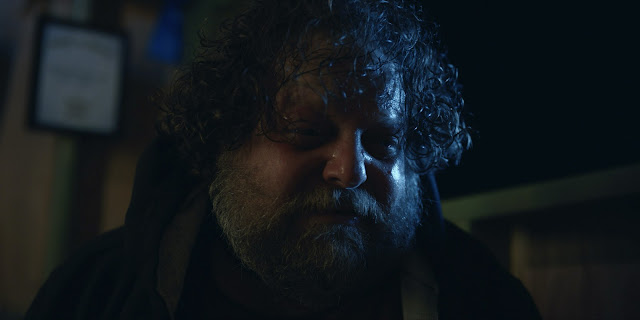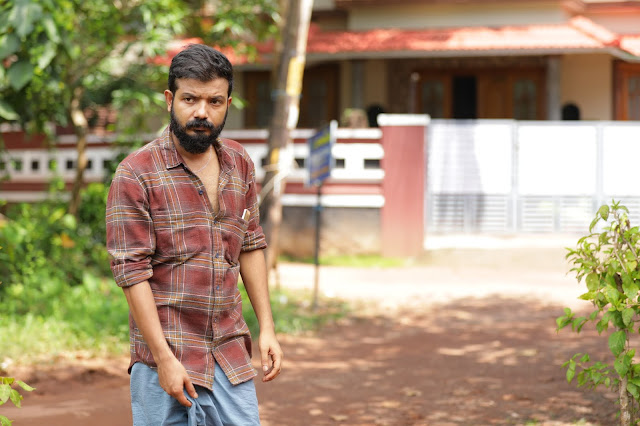Malayalam film ‘#Home’ celebrates family bonds
By Mythily Ramachandran
There is no place like home-those four walls within which one can be yourself –warts and all-and among people who love you for being you.
Malayalam director Rojin Thomas’s new film, ‘#Home’ is all about this special space. And, he builds a heart-warming family drama story laid on the bricks of love and honesty.

Indrans as Oliver Twist
Oliver Twist (Indrans) is an unusual name for a protagonist of a Malayalam film. Oliver’s father (Kainakary Thankaraj ) worked as a typist in the fifties and used to type English stories into Malayalam. The classic ‘Oliver Twist,’ was his favourite. He chose that name for his firstborn. Subsequently, Oliver’s brother was named Peter Pan, and his sister, Mary Poppins. The English language’s hangover continues today with the old man, who speaks only in English in this Malayalam ‘home.’
Sreennath Bhasi is Antony, a film director
Oliver’s eldest son, Antony (Sreenath Bhasi), made an impressive debut as a film director but with his second script, he is struggling with writer’s block. At the suggestion of his producer Baby (Maniyanpilla Raju) Antony goes to the very place where he wrote his first script-his home. And, like every home, his home encapsulates drama and chaos.
L-R-Sreenath Bhasi, Nalson Ghafoor, Indrans and Manju Pillai
Three generations live under the same roof-a grandfather who cannot hold his bladder; Oliver, the technology illiterate simpleton learning to use his new smartphone; his wife Kuttiyamma, (Manju Pillai) a pragmatic woman, who minces no words with her sons; their eldest son Antony in love with Priya (Deepa Thomas)- the only daughter of Joseph (Srikanth Murali) an illustrious man and Charles (Nalsan K Ghafoor ) Anthony’s younger brother -an Instagram addict.
Thomas shows his grip as a storyteller. The screenplay flows seamlessly. Without making it a melodramatic tale spouting a social message, Thomas captures relationships with a sincerity that makes ‘Home’ real and relatable. There are moments in ‘Home’ that might seem to have been lifted from your and my home.
The generation gap is there to see. Oliver’s sons are loving guys but it’s their cocky attitude so typical of the new age that causes hurt and pain to their parents. Oliver who loves his sons to a fault takes the brunt of it. ‘Home’ appeals with its emotional moments that are universal –the shaky relationship between parents and children once they turn adults- the young generation’s dismissal of their parents’ ideas and taking them for granted-will ring true for many in the audience.

Holding up ‘Home’ is a brilliant team of actors. The casting is pitch-perfect. Thomas elicits fabulous performances not just from his main actors but from every member on board. Indrans proves that the comedian in him can shoulder more significant roles. His Oliver-a diminutive and unassuming man- wins hearts all the way. With little touches and nuances in his expressions, the Kerala state awardee brings out the pain and disappointment that Oliver tries to conceal while interacting with Antony.
Sreenath Bhasi plays the young director to the hilt. Antony’s unkempt hair and beard certainly remind us of our sons. The supporting characters are vividly drawn. Manju Pillai’s chemistry with Indrans is amusing. They play the perfect tango. While Oliver is forgiving of his sons’ behaviors it is Kuttiyama who always puts her sons in place. Humour is neat-situational largely. Ghafoor brings in the laughs. His Charles is an inveterate talker who is busy posting videos on social media.
Actor-Producer Vijay Babu plays a psychologist
Another interesting role is taken on by Malayalam director Johny Antony. He is Oliver’s childhood friend, Suryan. Their camaraderie is fun. Vijay Babu who has produced the film under his banner, ‘Friday Film House’ essays a psychologist. It took a while to recognize Srikanth Murali as the bald Joseph. Murali who has explored different roles earlier leaves his mark again. His Joseph is not one forgotten.
A poignant scene stayed with me. The family returns home from Joseph’s birthday party. Oliver sits down beside Antony and tells him, “Son you were right. Lightning cannot strike through a mobile. I checked it on the internet.” What follows is beautiful- the show of affection between the father and son-spoken in silence.
Cinematographer Neil D Cunha’s frames follow the characters closely, sometimes getting intimate with their feelings. Cunha’s shots are spectacular-Oliver’s house built on different levels is a beauty in its simplicity.
‘Home’ reinforces the universal truth that human goodness always prevails. And, there might be something extraordinary in the life of an ordinary man. Told from the heart ‘Home’ is a must-watch for all age groups. Clearly, everyone will agree with Antony-‘I am always imperfect at my home.’
Catch it on Prime Amazon.











































